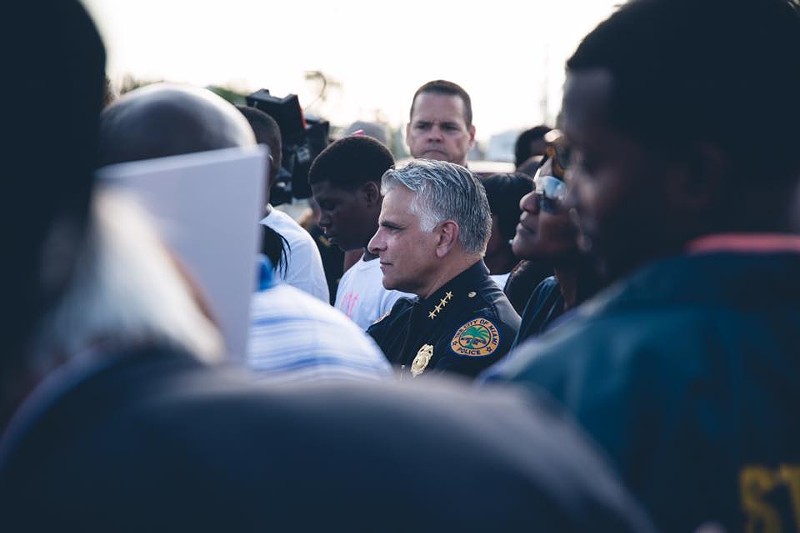Well, it has allegedly happened again: The CIP this month says it found three cops in two incidents who either failed to turn on their cameras or otherwise misused them. On its own, the find would be upsetting, but because the CIP has been warning Miami PD about this issue for years, the news should upset people.
Moreover, police disciplinary records obtained by New Times show that, of the three officers, the department's internal affairs bureau disciplined only one for failing to record an incident.
In the first incident, a local complained to the CIP last January that one Miami officer, Armando Rigau, had allegedly been driving the wrong way down a one-way street on his police motorcycle. Rigau issued the citizen a ticket for parking in a handicapped zone. The CIP told the complainant that, in many cases, cops can legally break traffic laws. The citizen then withdrew his complaint. But during the investigation, the CIP noticed something odd: Rigau hadn't noted on any paperwork he'd made the traffic stop or activated his body cam. And when the CIP eventually obtained the footage, it was laughably incomplete: CIP documents state Rigau turned on the camera only at the end of the exchange, after he'd issued the ticket.
"Staff obtained the video and finds that the 2 minute and 14 second video started toward the end of the traffic stop, after the citation had been issued," CIP documents state.
In a second case, a man last April filed an internal affairs complaint alleging he let MPD officers search his home for a "female suspect." The man said an unnamed officer had threatened him and cursed at him during the exchange.
The CIP was able to identify two officers involved in the search: Remy Martinez and Alain Castellano. Both had been issued body cams. But the panel found that Martinez didn't record the incident. And perhaps even more troubling, the CIP wrote that Castellano began recording during the home search but then "abruptly" shut off his camera in the middle of the incident, before a civilian was detained in the back of a squad car and ultimately released.
"As a result of our investigation, Staff found that Officer Castellano failed to record with his body-worn camera, the full incident, document why he abruptly shut his camera off, and failed to document the footage on his Uniform Officer Worksheet," CIP documents read.
CIP investigators recommend sustaining violations against all three officers. The panel will meet tomorrow to formally vote on the cases. (The CIP, which is made up of everyday citizens, can only verbally scold officers and cannot mete out punishments.) Internal affairs records show that, of the three officers, only Martinez was disciplined by MPD.
The CIP has been warning since at least 2016 that Miami officers routinely misuse the recording devices: Last June, the panel sent a letter to Chief Jorge Colina warning that body-cam policies are "not being strictly followed" and that, of the ten cases the panel reviewed involving body cams in the 12 months before the letter was sent, cops in five cases failed to record any footage. Three other cops recorded only partial footage. And in the two cases where officers turned on their recorders, the evidence actually exonerated the police department.
The CIP even rebuked a repeat offender: Officer Shane Tardieu, who in two cases had been accused of acting aggressively but had not recorded either incident. The panel in June warned that the lack of compliance made investigators worry whether officers were up to no good.
In response, Chief Colina told New Times that he believes the cameras are a positive development and that he aggressively disciplines his officers who fail to use the recording devices correctly. He said he thinks the CIP's criticisms are unfair: The department recently provided New Times records showing that internal affairs had issued 18 violations to cops from January through October 2018. The department said it had disciplined ten officers for camera violations the previous year.
In November, however, the CIP issued a yearly comprehensive report, which again admonished the department for failing to record incidents. The panel noted that, for the past three years, half of all body-cam cases included some sort of policy violation.
"The CIP is concerned about the non-use of the devices, the lack of policy compliance, and the police department’s inability to publicly report its experiences with the cameras," the report warned last year.













